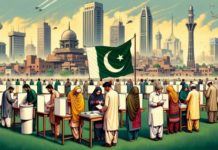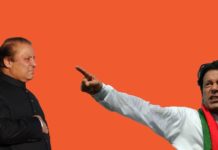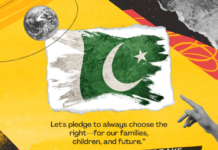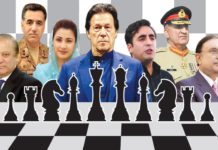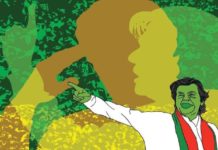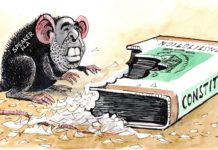On July 26, Maulana Tariq Jamil’s held a meeting with Imran Khan at the Prime Minister’s secretariat. The not-so-curious meeting between the two attracted considerable attention on the social media. Meantime, a video message in support of Imran Khan’s government, by our highly-performative Maulana, began to circulate in the blagosphere.
If truth be told, Maulana’s support for Imran Khan is hardly surprising. The two are, in fact, Siamese twins.
Imran Khan is Tariq Jamil of politics while Maulana is Imran Khan of religion. Both are one-dimensional. The solution to every problem, according to Imran Khan is anti-corruption. In the case of Maulana, Taliban’s puritan terror to earthquakes and floods are caused by our sins. The solution is Tauba (repentance).
Maulana Tariq Jameel meets PM Imran Khan
Both are not-so-incidentally supportive of the Taliban. While Imran is known as the Taliban Khan who wanted to open an office for the Taliban in Islamabad, Maulana Tariq Jamil could not utter a single word to condemn the Taliban atrocities even after the ghastly attack on the Army Public School, Peshawar. When Pakistan was bleeding from head to toe owing to the Taliban terror, otherwise teary-eyed Maulana remained unmoved. Pakistan, he claimed, would benefit from the killings (‘sacrifices’ in Maulana’s polite lingo) in suicide bombings. While the Taliban were literally playing football with the severed heads of Pakistani soldiers, Maulana was urging the faithful to perform Tauba in order to fight back the Taliban terror (as if suicide bombings were the wrath of God).
Neither of them had any problem ever either with the military dictators or the military dictatorships in the country. After the Pakistan side lost in semi-finals in the 1987 cricket world cup, Imran Khan called it a day as a cricketer. However, he retracted his resignation on General Zia’s insistence. While Maulana Tariq Jamil had perhaps not yet joined Tableeghi Jamaat when Gen Zia was at the helm, his Party of Preachers was always warmly welcoming the most brutal dictator in Pakistan’s history at their Raiwind headquarters. Did Maulana ever regretted a dictator’s visit to Raiwind? No such luck!
Is PTI’s government outsourced?
Under the Musharraf dictatorship, Imran Khan whole-heartedly lent support to the regime. It was only afterwards, when Gen Musharraf did not amply reward Imran Khan, that the cricketing star began opposing the dictatorship. It was a case of sour grapes. Meantime, Maulana was never eager to pick up the gauntlet when millions were taking to streets for the civil rights on the platform of Advocates Movement. If anything, both kept confusing their audiences on the question of war on Terror. For Imran Khan, it was an American war imported to Pakistan. For Maulana, asstated above, suicide bombings were consolidating Pakistan.
Both have contributed to depoliticise the people of Pakistan. Imran Khan, paradoxically, by mobilising people on the platform of his PTI has only vulgarised, brutalised and trivialised the political discourse and the political culture. His neo-fascist style of politics has generated contempt for the poor and democracy. His undemocratic trolling battalions silence every dissenting voice by way of harassment instead of logic. Consequently, dissenting voices prefer staying silent. His role model is General Ayub Khan, Pakistan’s first military dictator who thought democracy is not meant for such hotter climes as the one in Pakistan. Imran Khan and his fan club respect a democratic verdict only when the majority votes the PTI. They do not mind if a majority has to be rigged in their favour. In short, the Imran Khan brand of politics is actually anti-politics. Meantime, Maulana has never spoken for the rights of disempowered workers or peasants. He never advocates building of trade unions, peasant organisations and social movements in order to empower the subaltern classes in the country. He has no problem with either capitalism or feudalism. His only advice to the poor is: Tauba. Imran Khan’s anti-politics as well as Maulana’s preaching of repentance only help maintain status quo. Both are most useful servants of the system of oppression.
Ironically, both Imran Khan and Maulana live a life of utmost luxury. Both live in palatial villas. Drive around in offensively expensive motor vehicles. Relish the best of meals. Travel in the first class as globe trotters. Enjoy the hospitality of their fan clubs. After all, both are the play boys. While Imran Khan has already lived the life of a playboy in this world, Maulana is waiting on his entry to Jannah.
Both are double-faced to the hilt. Imran Khan can kneel before a holy grave (to please his Brelvi voters) as well as donate millions out of tax-payers’ money to Maulana Sami-ul-Haq’s madrassa (to please Deobandis). Likewise, Maulana can warmly hug Imran Khan and after leading Kulsom Nawaz’ funeral prayers, he can offer his deepest condolences to Nawaz Sharif too.
Both are Siamese twins!



